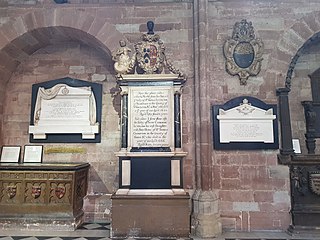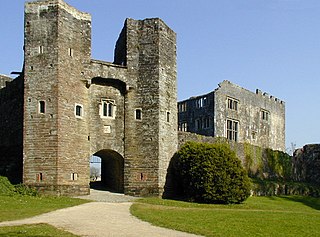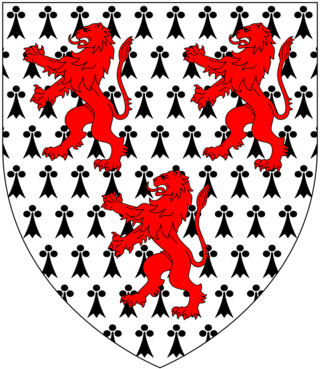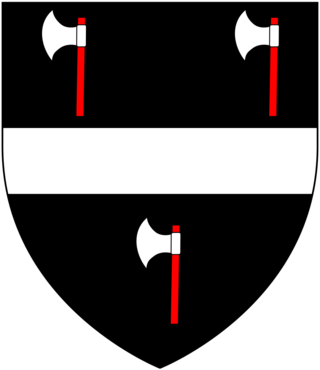Related Research Articles
Baron Wrottesley, of Wrottesley in the County of Stafford, is a title in the Peerage of the United Kingdom. It was created on 11 July 1838 for Sir John Wrottesley, 9th Baronet. He was a Major-General in the Army and also represented Lichfield, Staffordshire and Staffordshire South in House of Commons. The Wrottesley family's original patronymic was 'de Verdun', which meant that the creation of the title Baron Wrottesley represented the third barony created by a branch of the de Verdun family in England. The other two were established by Theobald de Verdun, 1st Baron Verdun of Alton Castle and Sir John de Verdon, 1st Baron Verdon, lord of Brixworth in Northamptonshire and Bressingham in Norfolk.

Sir Thomas Lyttelton, 1st Baronet was an English Royalist officer and politician from the Lyttelton family during the English Civil War.

Sir Harbottle Grimston, 2nd Baronet was an English lawyer and politician who sat in the House of Commons at various times between 1640 and 1685 and was Speaker in 1660. During the English Civil War he remained a Parliamentarian but was sympathetic to the Royalists.
Sir William Constable, 1st Baronet was an English soldier, politician and regicide, who supported the Parliamentary cause during the English Civil War and interregnum.
Sir Edward Waldegrave, 1st Baronet was an English soldier, MP and Cavalier during the English Civil War and a grandson of Sir Edward Waldegrave.
The holder of the post Vice-Admiral of Devon was responsible for the defence of the county of Devon, England.

Sir Henry Brooke, 1st Baronet was an English soldier and politician.
Sir Thomas Bowyer, 1st Baronet was an English politician who sat in the House of Commons at various times between 1614 and 1642. He supported the Royalist cause in the English Civil War.

Cornwall played a significant role in the English Civil War, being a Royalist enclave in the generally Parliamentarian south-west.
There have been two baronetcies created for members of the Haggerston, later Constable Maxwell-Scott family, one in the Baronetage of England and one in the Baronetage of the United Kingdom. Only one creation is extant as of 2008. The Haggerston, later Constable Maxwell-Scott Baronetcy, of Haggerston in the County of Northumberland, was created in the Baronetage of England on 15 August 1642 for Thomas Haggerston, of Haggerton Castle, Northumberland, a loyal Royalist who served as a colonel in the army of King Charles I. The Haggerston were recusant in the 17th century and the estates were sequestered and forfeit to the Commonwealth of England in 1649 but were repurchased by the first Baronet in 1653. The line of the fourth Baronet failed on the death of the twelfth Baronet in 1972. The title reverted to the line of William Haggerston, second son of the third Baronet and younger brother of the fourth Baronet. In 1746 he inherited estates in Yorkshire from his great-uncle Sir Marmaduke Francis Constable, 4th and last Baronet, of Everingham, and assumed the surname of Constable in lieu of his patronymic. In 1758 he married Winifred, daughter of Robert Maxwell, titular sixth Earl of Nithsdale, and assumed by Royal licence the additional surname of Maxwell. Winifred was considered to be the heiress to the Scottish lordship of Herries of Terregles held by her father. Constable-Maxwell built a new house at Everingham Park on the Constable estate in Yorkshire.
There have been four baronetcies created for members of the Thorold family of Lincolnshire, two in the Baronetage of England and two in the Baronetage of Great Britain. As of 2014 one creation is extant.
Richard Molyneux, 1st Viscount Molyneux (1594–1636) was an English politician who sat in the House of Commons at various times between 1614 and 1629.
Richard Byron, 2nd Baron Byron was an English nobleman, Royalist, politician, peer, knight, and supporter of Charles I during the English Civil War.

Sir Edward Seymour, 3rd Baronet of Berry Pomeroy Castle was an English politician who sat in the House of Commons at various times between 1640 and 1688. He fought for the Royalist cause in the English Civil War.
The Tresham Baronetcy, of Rushton in the County of Northamptonsire, was a title in the Baronetage of England.
There have been two baronetcies held by people with the surname Lamb, both in the Baronetage of Great Britain. Both creations are extinct.
The Lawday Baronetcy, of Exeter in the County of Devon, was a title in the Baronetage of England. It was created on 9 November 1642 for Richard Lawday. The title became extinct on his death in 1648 while fighting for the Royalist cause in the Civil War. The title was claimed in the 19th century by a Mr Charles Lawday, of Bath, Somerset.

Sir Gilbert Hoghton, 2nd Baronet was an English politician who sat in the House of Commons variously between 1614 and 1640. He was a Royalist leader during the English Civil War.

Sir George Chudleigh, 1st Baronet, of Ashton, Devon, was an English landowner and politician, who sat in the House of Commons at various times between 1601 and 1625. He had close family connections to a group of Devon Presbyterians, including Sir William Strode.

Sir Chichester Wrey, 3rd Baronet (1628–1668) of Trebeigh in the parish of St Ive, Cornwall and of North Russell in the parish of Sourton, Devon, was an active Royalist during the Civil War and was Colonel of the Duke of York's Regiment and served as Governor of Sheerness.